Jump to ...
Fed Rate Cut Could Spur Retail Real Estate Acquisitions, Experts Say
Vestar Reveals Plans for $2B Legacy Park Mixed-Use Development in Mesa, Arizona
Northmarq Report: Onyx Partners’ $947M JCPenney Portfolio Buy Signals Redevelopment Push
CBL CEO Stephen Lebovitz: “The Mall Is Relevant Again”
Investor Demand for Retail Properties Stays Strong With New Deals
How Retail and F&B Sales Fared in August
Yardi Names Rob Teel as Next CEO, Effective January
Fed Rate Cut Could Spur Retail Real Estate Acquisitions, Experts Say
JLL Income Property Trust president and CEO Allan Swaringen thinks this week’s cut in interest rates might spur more acquisitions in retail real estate. But he told C+CT that he doubts this decrease or additional anticipated cuts will lead to more ground-up retail development. Why? “There’s still a sense that America might be a little over-retailed,” he said.
For the first time since December, the Federal Reserve has lowered the benchmark interest rate. At a meeting on Wednesday, the Federal Open Market Committee dropped its key rate by 25 basis points to a range of 4% to 4.25%. The committee signaled it might carry out two more 25-basis-point rate cuts this year, Reuters reported.
In a lower-rate environment, acquisition activity might be especially strong in grocery-anchored retail, thanks to the asset type’s solid cash flow and lengthy leases, according to Swaringen. “You don’t have the same volatility as, say, apartments, and you haven’t seen the same rent spikes as you have in industrial,” he said. Generally, acquiring grocery-anchored centers is a “good yield-oriented investment,” he added. JLL Income Property Trust’s $6.5 billion portfolio includes 15 grocery-anchored centers.
According to Thorofare Capital principal Eddie Prosser, the move will enable higher debt service coverage and “the ability for equity investors to underwrite more attractive levered returns.” The rate cut’s message of stability should increase transaction activity, development and construction lending, and land acquisitions, he said.
Slatt Capital CEO Daniel Friedeberg, meanwhile, said most investors had already made decisions based on the Fed’s own projection that it would cut the federal funds rate, and thus he doesn’t expect much change based on this week’s announcement. “There would have been a significant reaction if the Fed did not cut or cut more than expected,” he said.
Vestar Reveals Plans for $2B Legacy Park Mixed-Use Development in Mesa, Arizona
Vestar has revealed plans for the multibillion-dollar Legacy Park, a 9.4 million-square-foot mixed-use project in the Phoenix suburb of Mesa. Vestar’s partner on the project is Pacific Proving, which owns the 200-acre site where Legacy Park will be built. Groundbreaking is set for 2027.
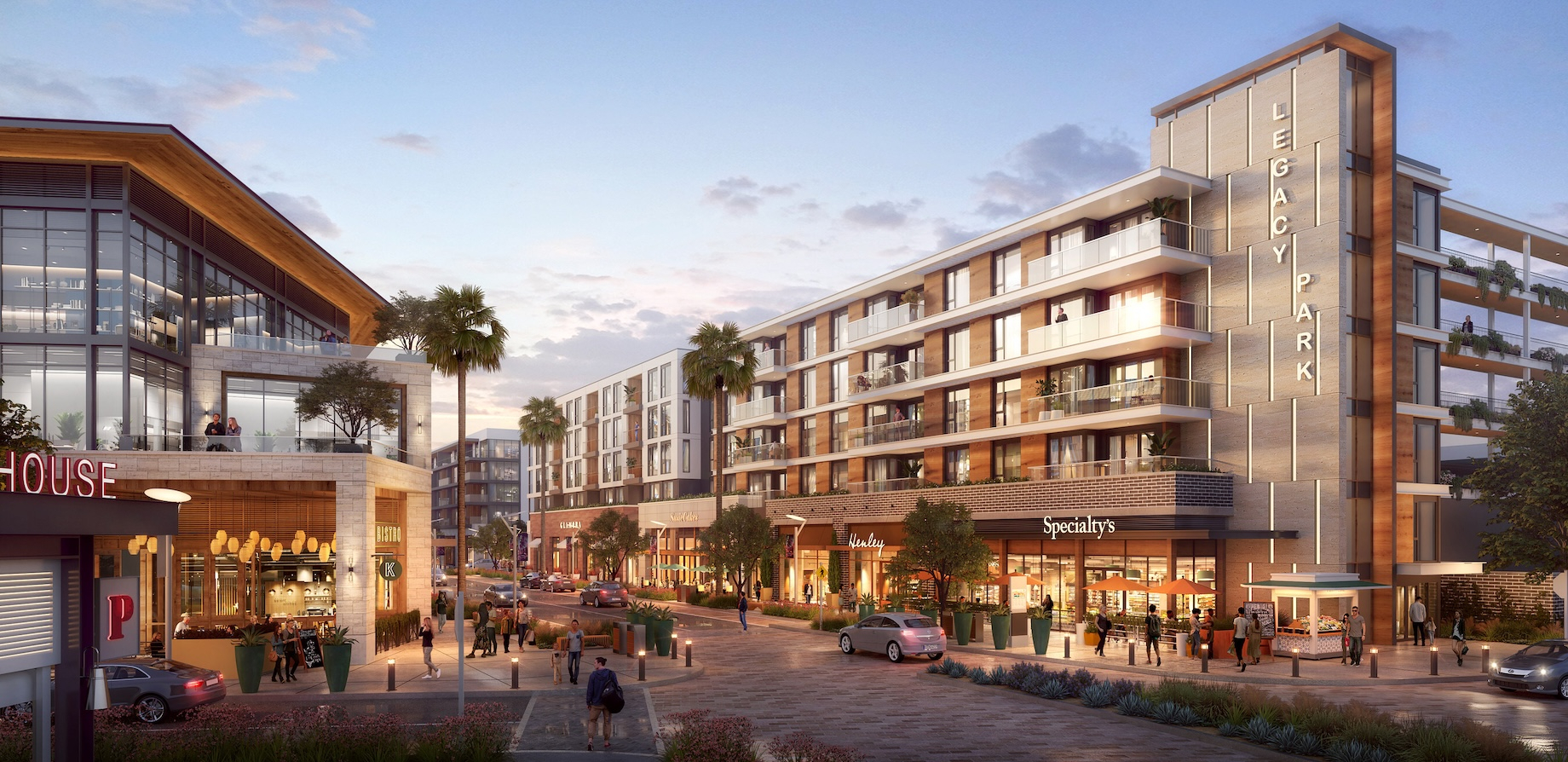
Plans for the Legacy Park mixed-use development in Mesa, Arizona, include 300,000 square feet of retail and restaurants. Image above and at top courtesy of Vestar/PRNewsFotos
The first phase will cost more than $1 billion, CoStar News reported, and the entire project carries a price tag of $2 billion, according to Commercial Property Executive. At buildout, Legacy Park will include 300,000 square feet of retail and restaurants, 2,500 apartments, a 600-key resort hotel and 3.4 million square feet of office, the developer said. “Legacy Park is a generational project that will become an urban oasis and the centerpiece of the East Valley,” Vestar president and CEO David Larcher said.
More Projects in Mesa and Phoenix
Mesa’s Fiesta Mall Poised for a Major Mixed-Use Redevelopment
Medina Station Will Add Sit-Down Restaurants to the Market
9 Big Phoenix Retail Developments After 15 Years of Nothing
Northmarq Report: Onyx Partners’ $947M JCPenney Portfolio Buy Signals Redevelopment Push
Onyx Partners’ planned $947 million purchase of 119 JCPenney stores, scheduled to close Oct. 8, might look like a play for the long-term income on more than 15 million square feet of big-box space triple-net leased through 2041. But Northmarq sees it another way.
The deal is much more about the opportunity to redevelop the land for uses like hotels, housing and healthcare facilities, the company believes. “A 10.3% cap rate and a basis near $60 per square foot suggest a focus on land control and redevelopment rather than tenant performance,” Northmarq wrote in a new report, From Anchor to Asset: What the JCPenney Portfolio Signals for Big Box Owners.
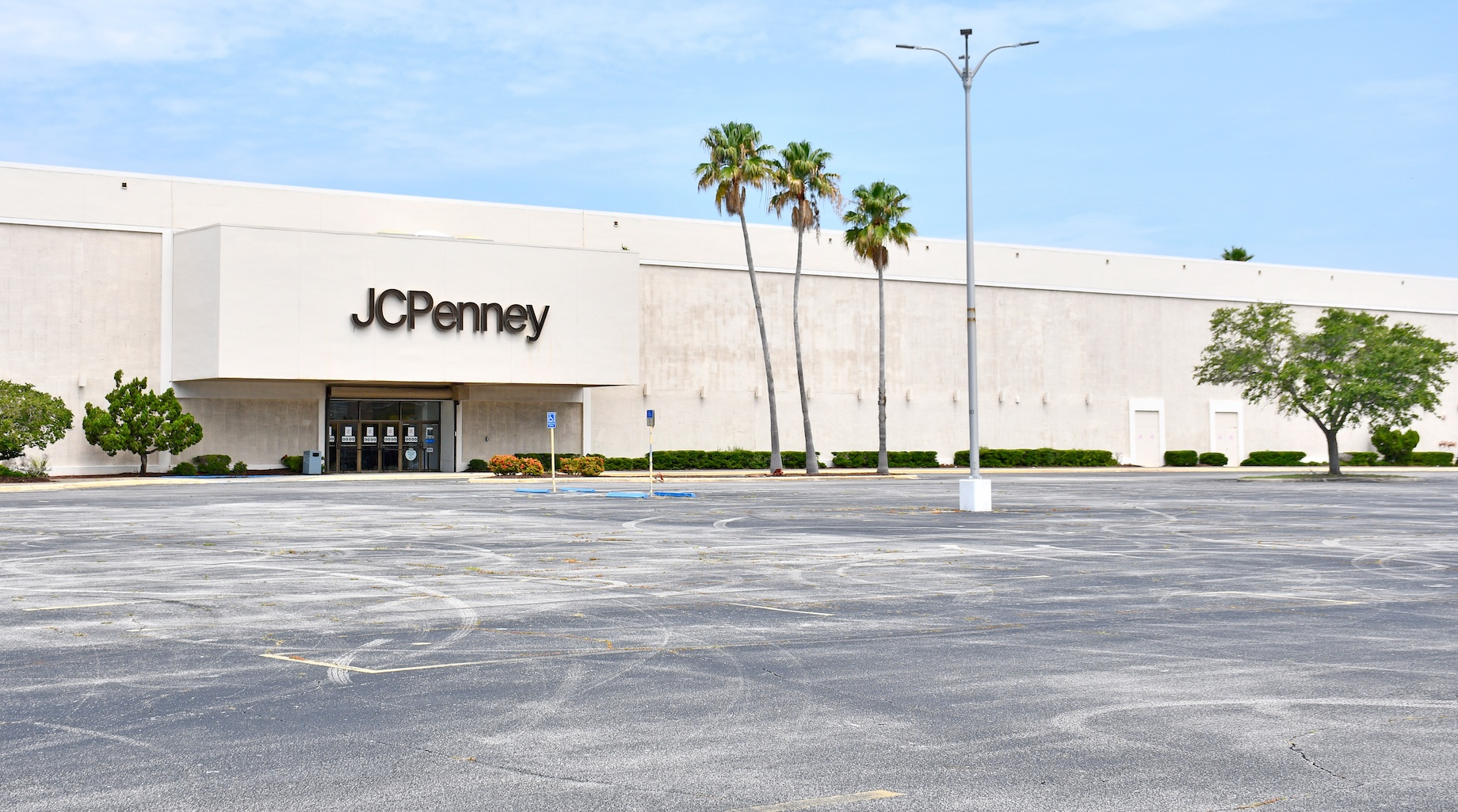
Photo credit: Ryan Tishken - stock.adobe.com
“These sites are no longer just retail. They have become redevelopment puzzles shaped by zoning overlays, reciprocal easement agreements and political will,” said the report. “Some will require demolition. Others will need to be parceled, repositioned or rebuilt from the ground up.” Northmarq noted that many parcels are 10 acres or more and offer high visibility. The report added: “The buildings still have tenants, yet investor focus has shifted to what these sites can support next.”
Onyx Partners and the seller, Copper Property CTL Pass Through Trust, extended the sale’s closing date from Sept. 8 to Oct. 8, according to a press release from Copper Property.
CBL CEO Stephen Lebovitz: “The Mall Is Relevant Again”
CBL CEO Stephen Lebovitz recalls the days of what he labels the “cookie-cutter” mall: the same anchors, many of the same stores, similar designs. Today’s successful mall doesn’t fit into that old mold, he believes.
“For every mall in our portfolio, we have an individual strategy for it, and we have bespoke uses that we’re trying to bring in, depending on the market,” he said on a recent episode of CBRE’s The Weekly Take podcast. “Because of that and the success that we’ve had and others in the industry [have had], the mall is relevant again.”
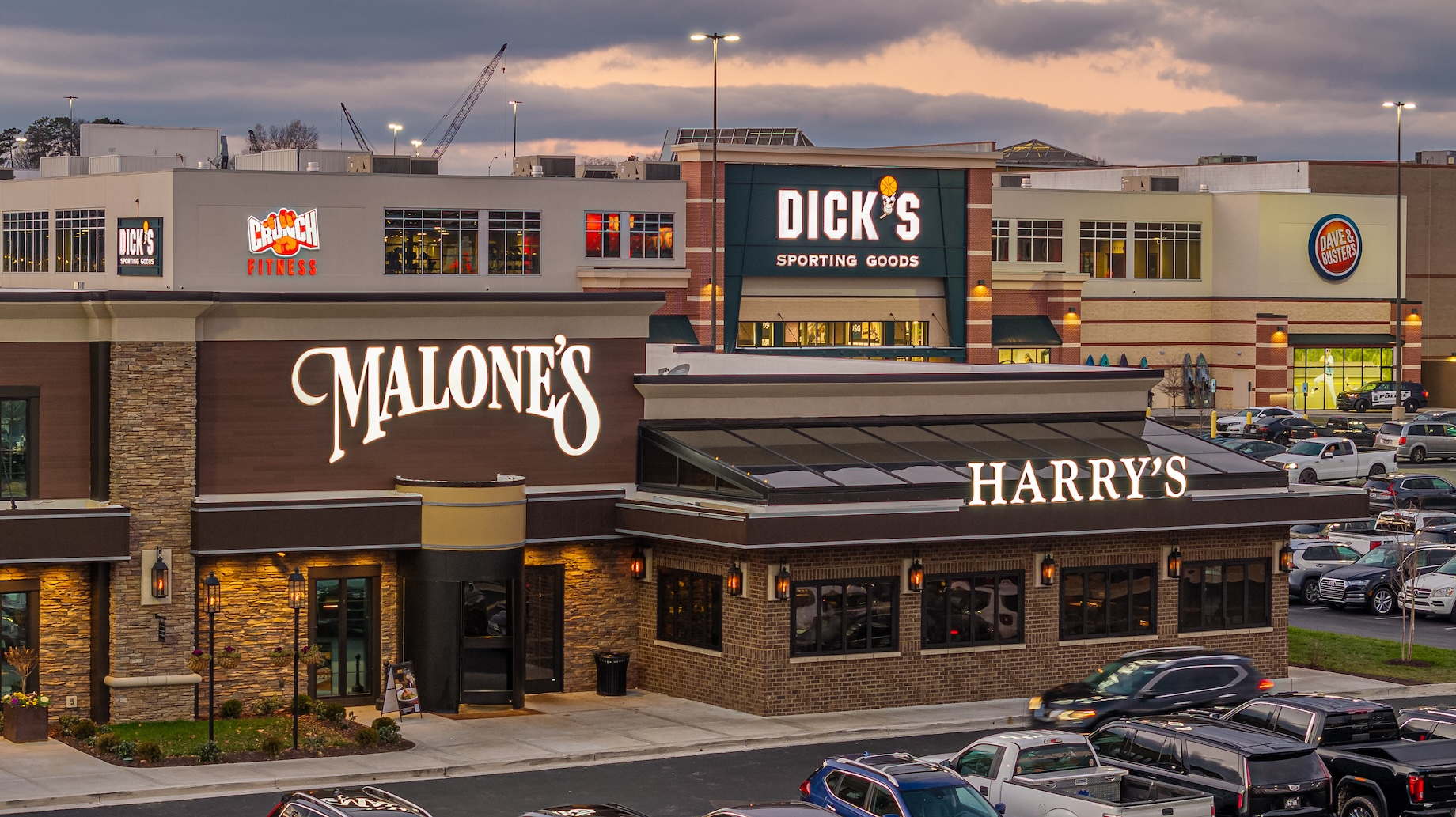
At Chattanooga, Tennessee’s Hamilton Place, CBL replaced a Sears with Dick’s Sporting Goods, Dave & Buster’s and Crunch Fitness and added a Cheesecake Factory, Aloft Hotel and Malone’s restaurant in the parking lot. On CBRE’s The Weekly Take podcast, CBL CEO Stephen Lebovitz said those new tenants add up to six to 10 times the traffic and sales that Sears had. Photo courtesy of CBL Properties
CBL’s portfolio comprises 89 properties spanning 55.4 million square feet, including 55 enclosed malls, outlet centers and lifestyle centers. The size of the REIT’s portfolio continues to fluctuate. For example, CBL spent $178.9 million this summer to buy four enclosed malls from WPG. Meanwhile, it is disposing of noncore properties and funneling the proceeds into the acquisition of “stable and growing assets.”
CBRE global client strategist and senior economic adviser Spencer Levy, who hosts The Weekly Take, appeared on Episode 8 of the From Where I Sit podcast, hosted by ICSC president and CEO Tom McGee.
Investor Demand for Retail Properties Stays Strong With New Deals
Shopping centers continue to drive interest from investors.
Tanger Buys Legends Outlets Kansas City for $130M
Tanger just purchased the Legends Outlets in Kansas City, Kansas, for $130 million using a $115 million commercial mortgage-backed securities loan. The seller was private equity firm Walton Street Capital, the Kansas City Business Journal reported. Tanger will rebrand the property as Tanger Kansas City at Legends.
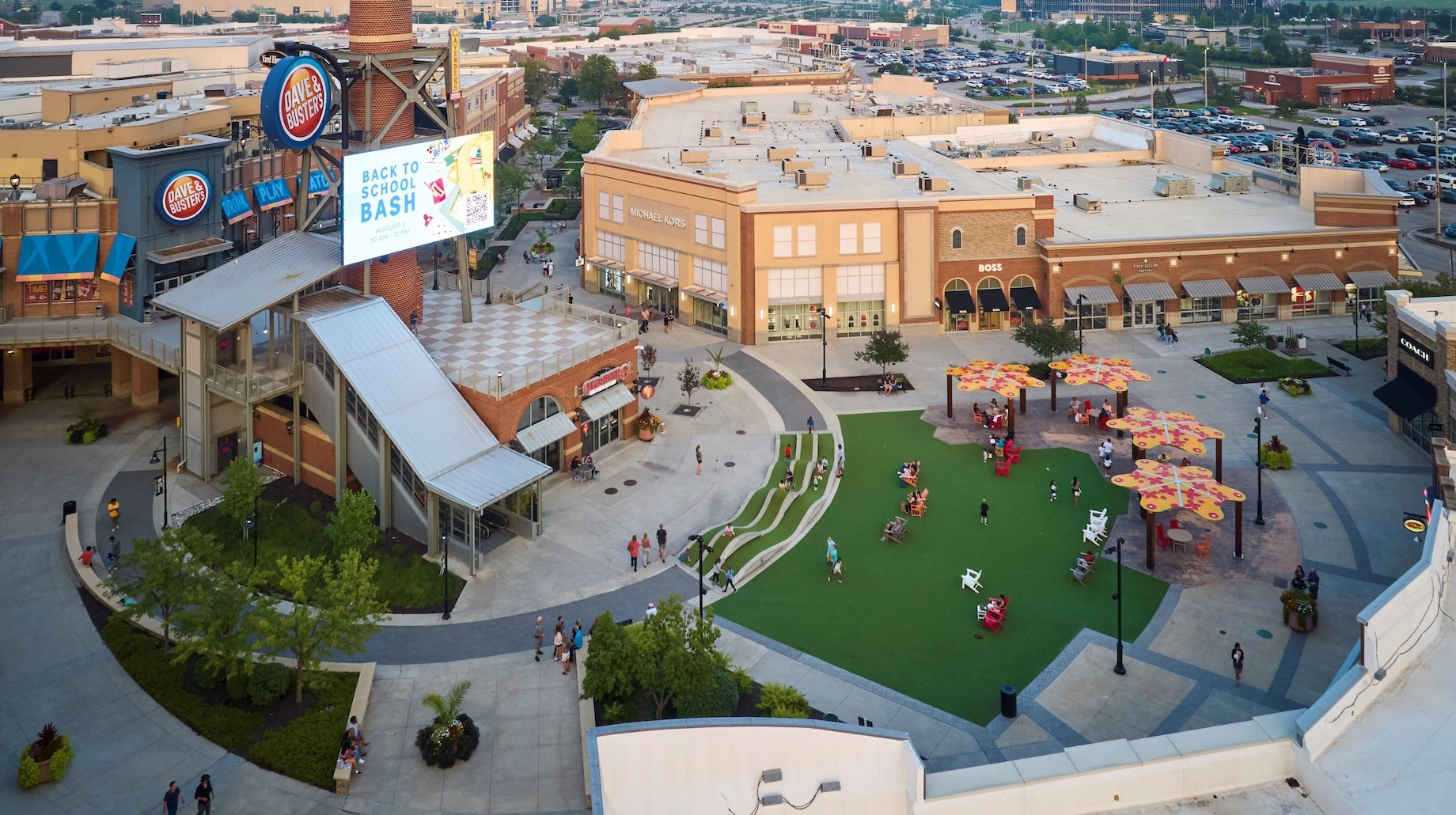
Tanger has added the Legends Outlets in Kansas City, Kansas, to its portfolio. Photo courtesy of Tanger/Businesswire
The outlet center “aligns perfectly with our strategy to acquire well-located, open-air centers supported by strong residential and economic market fundamentals,” Tanger CEO Stephen Yalof said.
The company estimates the center will generate an 8% return on investment in the first year. The occupancy rate at the 690,000-square-foot property is 93%, and tenants include Nike, Bath & Body Works, HomeGoods, Sephora, Kate Spade, Michael Kors, AMC Theatres, Dave & Buster’s and Yard House.
Stockbridge Buys Whole Foods-Anchored Uptown Boca for $118.5M
And amid the continuing hunger for grocery-anchored retail centers, real estate investment manager Stockbridge paid $118.5 million for the Whole Foods Market-anchored Uptown Boca in Boca Raton, Florida. JLL Capital Markets represented the seller, a joint venture comprising Giles Capital Group, Rosemurgy Properties, Schmier Property Group and Wheelock Street Capital. The property is fully leased. Other tenants include Homesense, Life Time, REI and Sephora.
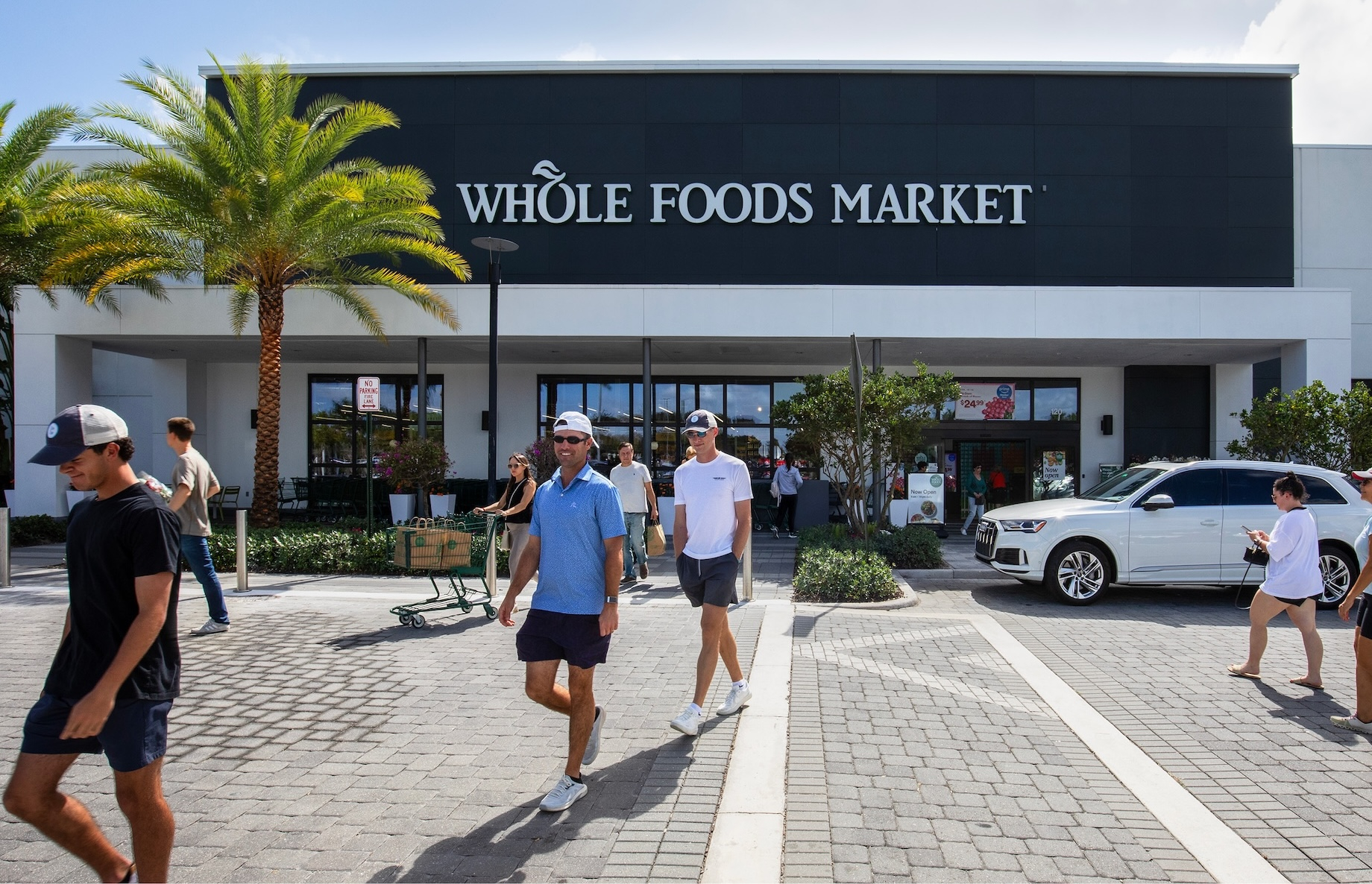
Whole Foods Market anchors Uptown Boca in Boca Raton, Florida. Photo courtesy of JLL Capital Markets
How Retail and F&B Sales Fared in August
Retail and food services sales in the U.S. — excluding motor vehicles and gas — rose 5.4% year over year in August, according to advance, seasonally adjusted data from the U.S. Census Bureau. It was the largest increase since December 2023. Such sales were expected to contract 0.1% from July to August but instead rose 0.7%.
ICSC research manager Matthew Panfel noted that back-to-school shopping pushed year-over-year sales growth to the highest in three-and-a-half years at clothing stores and the highest in two-and-a-half years at sporting goods, hobby, musical instrument and bookstores.
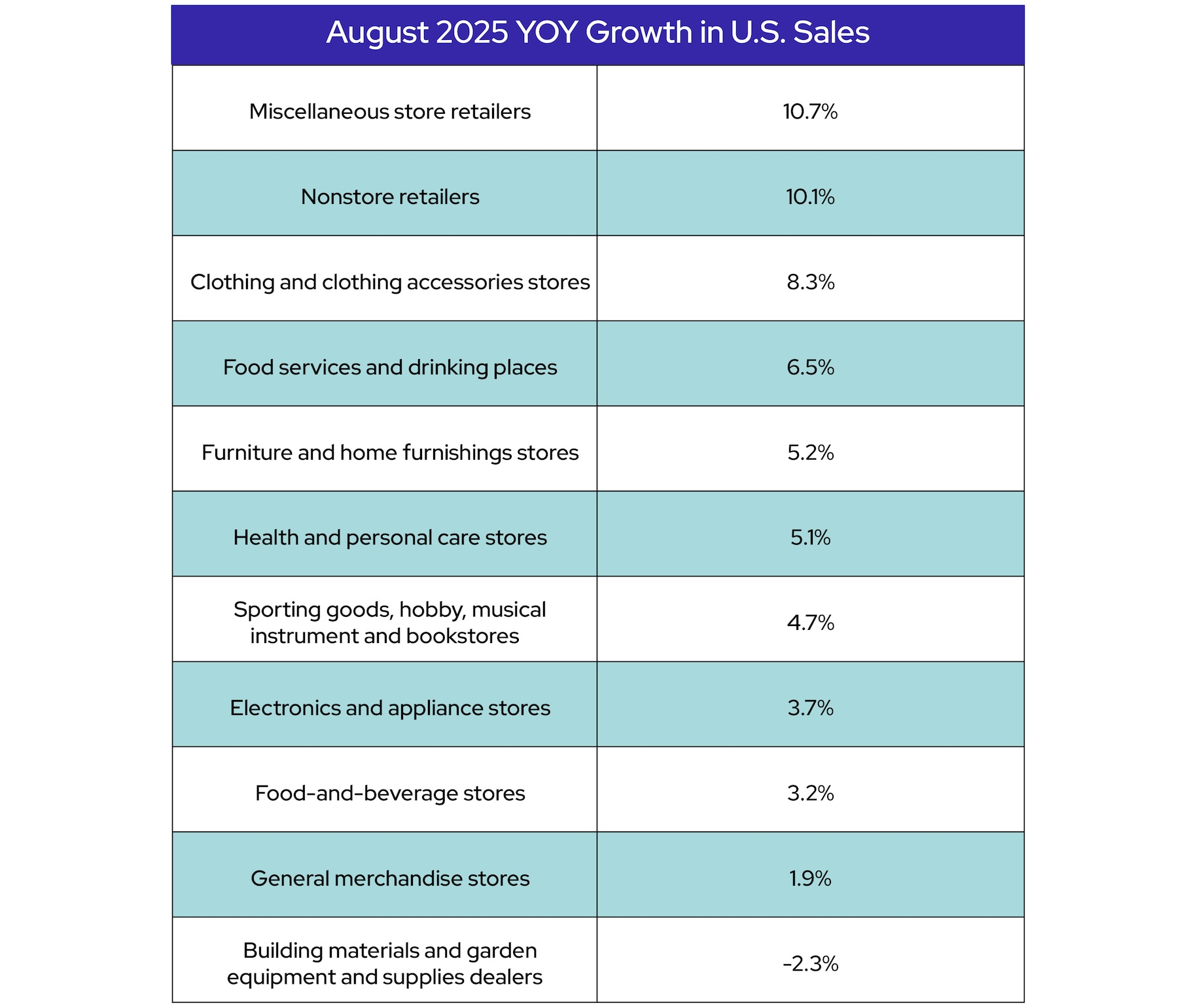
Seasonally adjusted, advance data Source: U.S. Census Bureau | Graphic: Commerce + Communities Today
Yardi Names Rob Teel as Next CEO, Effective January
Yardi — which provides investment, asset and property management software for the real estate sector — has named 22-year employee Rob Teel its CEO effective in January, according to Yardi-owned Commercial Property Executive. He’ll succeed Anant Yardi, who founded the company in 1984. Teel worked with multifamily clients when he joined the company, and he has led its global solutions business for 15 years, according to CPE.
—Additional reporting by Commerce + Communities Today editor-in-chief Amanda Metcalf and managing editor Katie Kervin
By John Egan
Contributor, Commerce + Communities Today